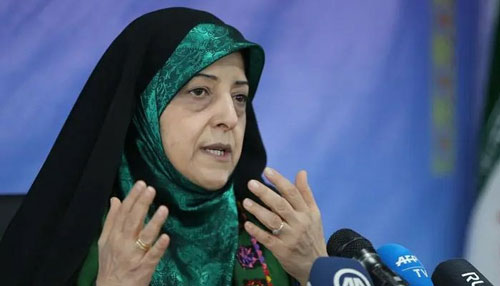Tehran
Iran reported seven new deaths from the coronavirus infection in the country over the past 24 hours, taking the death toll to 26 as the country struggles to contain the spread of the virus both at home and beyond its borders.
Health Ministry spokesman Kianoush Jahanpour also told a press briefing that 106 more cases of the disease had been confirmed, raising the tally of infections to 245, the highest outside China where COVID-19 originated.
Moreover, Iran’s vice president for women and family affairs, Masoumeh Ebtekar, has been diagnosed with coronavirus, mere hours after the country reported that seven more people had died, bringing the total toll to 26.
Iran’s top government brass seemed to be very susceptive to the coronavirus, as the latest confirmed patients included Mojtaba Zolnour, head of parliament’s national security and foreign affairs committee, and Iraj Harirchi, the deputy health minister and head of the government’s coronavirus task force.
As the country struggled to contain the spread of the virus both at home and beyond its borders, the state news agency confirmed in a report that Ebtekar had tested positive for the coronavirus.
The additional cases made up the highest number for a single day since Iran announced its first cases on February 19.
Among the latest sufferers of the new coronavirus is Mojtaba Zolnour, head of parliament´s national security and foreign affairs committee, who appeared in a video posted by Fars news agency saying he was in self-quarantine.
The cleric is a deputy for the holy city of Qom in central Iran where the country´s first cases were detected.
The announcement by Zolnour comes two days after another top official, deputy health minister Iraj Harirchi, head of the government´s coronavirus task force, said he too had contracted the virus.
On Wednesday, Iranian authorities announced domestic travel restrictions for people with confirmed or suspected infections.
They also placed curbs on access to major pilgrimage sites, including the Imam Reza shrine in second city Mashhad and the Fatima Masumeh shrine in Qom.
Visitors to the shrines will be allowed to visit on condition they are provided “with hand-washing liquids, proper (health) information, masks”, Health Minister Saeed Namaki told a news conference.
They must “not gather together in groups but just pray and leave”, he said. In affected areas, school closures will be extended for three days, and universities for another week starting from Saturday, he said.
Also in these regions, the main weekly Friday prayers will be suspended, Namaki said.
“All of these decisions are temporary and if the situation changes, we might intensify or ease them,” Namaki added.
International health experts have expressed concern about Iran´s handling of the outbreak. But Tehran insists the situation has been “improving”.
Pakistan on Thursday announced to suspend all flights to and from Iran as the first cases of the pandemic were confirmed in the country from travelers who had been to the country recently.
According to the Aviation Division, the suspension will come into force today at midnight and will remain in place till further orders.
Earlier, Sindh Chief Minister Murad Ali Shah has also suggested the federal government to stop flights till situation is brought under control.
“Flights from Iran should be suspended immediately in order to control the situation. These are just some of the preventative measures that we can take right now to stop the spread of virus,” he said.
Top officials sprung into action on Thursday with Punjab and Sindh adopting precautionary measures after two coronavirus cases were confirmed in Pakistan.—AFP










